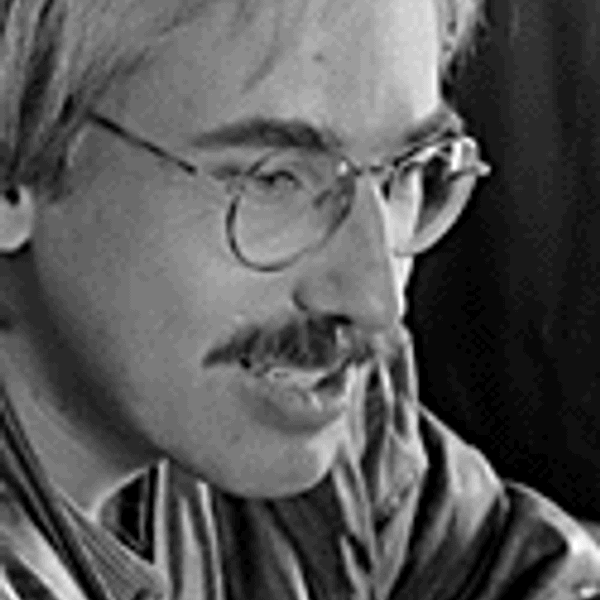Lia Purpura, Skate’s Egg Case (detail), featured in AGNI 102
Shadowboxing: For the Iraqi Dead
When the Word Trade Center went down, The New York Times generously and appropriately honored every body with a brief character profile composed with considerable artistry—a monument in miniature to the over two thousand gone. More than a gesture, the much-lauded feature underscored how much we value our fellow citizens—our neighbors, for Christ’s sake. Each of the dead was more than a face—each had a family and friends and interests opening into a web of ties that rippled throughout our society. Each man’s death diminishes me, wrote John Donne. And he was right.
Note that Donne didn’t qualify his statement by specifying that it was an Englishman’s death alone that reduced him. You may be sure he would have, had that been what he meant. He had a way with words.
While it may sound like the start of a very bad joke, one of the key questions we in the United States need to ask ourselves is: how is a dead Iraqi civilian different from a dead American (of any sort)? Certainly most of the dead began with two ears, two eyes, two arms, two legs. One heart. And we may assume all corpses carry the same passport.
Yet I suspect there must be some difference between them, between “their” dead and “ours”—otherwise, how could we justify paying so little attention to the Iraqi non-combatants we’ve killed? While there’ve been over two hundred “American” humans killed (every one of them unnecessarily, many by friendly fire), some 11,000 Iraqi civilians have died. They have died, we must acknowledge, for us. These are the people we decided wanted liberation. It was our call, and it was in response to our wound. In short, it was our cause. Their country—but never mind. Their lives, too. Oh well.
These slaughtered civilians are the very people Rumsfeld & Co. insisted would welcome us with open arms. And maybe they did. It’s possible that thousands of the dead were glad someone finally chased Hussein from Baghdad. What’s disturbing is that we’ll never know. For some reason, we don’t think it important to find out how many people we’ve murdered, never mind who they were.
It is unspeakable, almost. We kill innocent people, but we refuse to talk about it. Not in the media and not among ourselves. Ignoring the facts on the ground, however, doesn’t change them.
A few supporters of the war have said explicitly they’re not troubled by the civilian casualties (cost of doing business, etcetera)—yet not one has to my knowledge shown any interest in getting details about the dead.
Their indifference puzzled at first. Did they know something the rest of us didn’t? Were they savvy veterans, steeled in the ways of the world, the deeper truths of reality? Unfortunately, on closer inspection, it became clear that: a) these were almost never war veterans making such claims; and b) there was no deeper truth they were seeing, while there were many they were evading.
What they were hiding from were the faces of those whose deaths they helped bring about. Every one of the 11,000 dead civilians (never mind the military casualties) remains a presence on this planet, a permanent indictment of his murderers. Each had a family and friends—all of whom will remember how the victim died and who killed him. The blood on Lady Macbeth’s hands eventually drove her mad. The blood on the hands of our current murderous regime, and its many millions of supporters, has already had a similar effect. Bring on the death penalty. The games have begun. The only remedy to violence the mad can imagine is more of the same.
But the rest of us need not agree.

Askold Melnyczuk
Askold Melnyczuk—the founding editor of AGNI, for which he received the PEN/Nora Magid Award for Magazine Editing—is the author of four novels and a book of stories. What Is Told (Faber, 1994), was the first commercially published work of fiction in English to highlight the Ukrainian refugee experience and was named a New York Times Notable. Other novels have been selected as a Los Angeles Times Best Book of the Year and an Editor’s Choice by the American Library Association’s Booklist. His most recent book is a collection of stories, The Man Who Would Not Bow. His selected poems, The Venus of Odesa, is forthcoming from Mad Hat in summer 2025. A book of selected nonfiction, With Madonna in Kyiv: Why Literature Still Matters (More than Ever), will be published by Harvard University Press in 2026. He has edited a book of essays on the St. Lucian Nobel Prize–winning poet Derek Walcott and is coeditor of From Three Worlds, an anthology of Ukrainian writers from the 1980s generation. He’s the recipient of a Lila Wallace-Reader’s Digest Writers Award for fiction, the Heldt Prize for translation, and the George Garret Award from AWP for his work in the literary community. Individual poems, stories, essays, and translations have appeared in The New Yorker, The Paris Review, The Gettysburg Review, The Missouri Review, and elsewhere. Also the founder of Arrowsmith Press, he has taught at Boston University, Harvard, and Bennington College and currently teaches at the University of Massachusetts Boston. (updated 5/2025)
